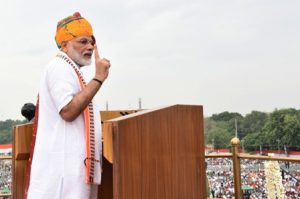Government to Declare India ‘Open Defecation Free’ on 2nd October
India, the largest democracy, it was also home to the largest number of people defecating openly, every day. Will the face of dirty India really change?

Prime Minister Narendra Modi announced Swachh Bharat Mission (SBM) or the ‘Clean India campaign in his first Independence Day Speech of his first tenure. On 2nd October 2014, PM Modi formally launched the SBM on Mahatma Gandhi’s birth anniversary. Exactly six years since its launch, the Government is set to confer the status of ‘Open Defecation Free’ (ODF), one of the components of the SBM to India on the 150th birth anniversary of Mahatma Gandhi. Throughout these six years, the Government has been on a spree of making lakhs of toilets. According to the government’s estimates, it had to build a toilet in India’s 64 million households in a span of six years.
According to a United Nations Report on Open Defecation, published in May 2014, a billion people across the world practised open defecation. Among them, India had the largest share of 597 million people defecating in the open, the report highlighted. Six years since then, the numbers globally have reduced to 673 million, with India (–47 per cent) being at the third spot among the countries that have seen the largest reductions in those defecating in the open. According to the World Bank Report, the practice of open defecation in India has reduced from a whopping 72.6 per cent in 2000 to 25.7 per cent in 2017. In rural India, the numbers have dropped from 90.1 per cent in 2000 to 36.3 per cent in 2017. Similarly, numbers for urban Indian population with at least basic sanitation facilities have increased from 49.2 per cent in 2000 to 72 per cent in 2017. Due to the sheer size of its population, India is the main determinant whether the Sustainable Development Goal (SDG) 6.2, that is, ‘By 2030, achieve access to adequate and equitable sanitation and hygiene for all and end open defecation, paying special attention to the needs of women and girls and those in vulnerable situations’ will be achieved or not.
According to the Ministry of Drinking Water and Sanitation that oversees the rural component of SBM, namely, Swachh Bharat Mission (Gramin), more than 10 lakh toilets have been built since the inception of the mission. 5,99,963 villages, 699 districts and all 35 states and UTs, pertaining to rural areas, have been declared ODF. Similarly, according to the Ministry of Housing and Urban Affairs, which is responsible for the mission’s urban component, namely, Swachh Bharat Mission (Urban), it has constructed about 55 lakh household toilets, 5.25 lakh community and public toilet has conferred the status of Open Defecation Free in urban India. If we add the numbers of household toilets built in both rural and urban India, the number comes out to be around 65 lakhs, which is exactly equal to the target set to declare India ODF.
Also Read : Infrastructure Development Behavioural Change Key Drivers Making Churu Odf District Kaswan
The experience on the ground has not been the same as the impressive numbers on paper. From faulty designs to poor solid liquid waste management, the mission is fraught with shortcomings and challenges.
The numbers and achievement claimed by the government appear to be overestimated, hence contentious. For example, data from the World Bank supported by India’s National Annual Rural Sanitation Survey (NARSS) in February 2019 showed that about 10 per cent of rural Indians practised open defecation. World Bank has provided a loan of $1.5 billion, exclusively for SBM. A similar research conducted independently by the non-profit Research Institute of Compassionate Economics (RICE), published in January this year, showed that 44 per cent of rural Indians still defecates in the open.
Despite the confusion over numbers, the numbers of those defecating in the open has certainly come down, more so after the launch of Swachh Bharat Mission.

But with more people using toilets, the issue of waste decomposition crops up, which has been unfortunately not stressed upon. Without proper arrangements for handling the waste, the despicable practise of manual scavenging is bound to rise and so are health implications and fatalities associated with it. Stigma related to caste associated with the issue further aggravates the problem. Inadequate and improper infrastructure for waste decomposition has the potential of contaminating soil and groundwater as well.
A number of cases have been reported where despite having toilets, people defecated in the open. The unavailability of water, faulty designs caste taboos and clinging to the old habit are the prime reasons. Building of toilets is undoubtedly the first step. People actually using them and sanitation coupled with solid-liquid waste management are bigger challenges that would collectively determine the actual success on the ground. Along with them, educating people about the benefits of using toilets is a crucial step in bringing about a behavioural change among the masses that practise open defecation.
Despite its several limitations, the mission has played its role in significantly reducing still births, diarrheal and malarial deaths, according to the Economic Survey, 2018–19, tabled in the Parliament in July this year. One of the sections of the society that has significantly benefited from the mission is the one comprising of girls and women. A simple step of building toilets has addressed the privacy concerns of millions of women who had to defecate in the open, most probably before the sunrise, due to lack of toilets in their homes. They earlier risked rape and sexual assault, while defecating in the open, and a huge more number of children, especially girls dropped out of schools due to lack of toilet facilities in school premises.
Also Read : Over 96 Toilet Use Confirms Independent Verification Of Swachh Bharat Grameen
With Swachh Bharat Mission to officially complete its target on 2 October 2019, the Government has announced its focus area for the second phase of the mission, that is, ‘water’. A separate Jal Shakti Ministry has been created that will subsume the Ministry of Drinking Water and Sanitation, responsible for overseeing the rural component of soon-to-be concluded Swachh Bharat Mission.
Prime Minister Narendra Modi was conferred the ‘Global Goalkeeper Award’ by the Bill & Melinda Gates Foundation on 25th September in New York for the success of the Swachh Bharat Mission. The same day, two Dalit children in Madhya Pradesh’s Shivpuri, were lynched for defecating in the open.
